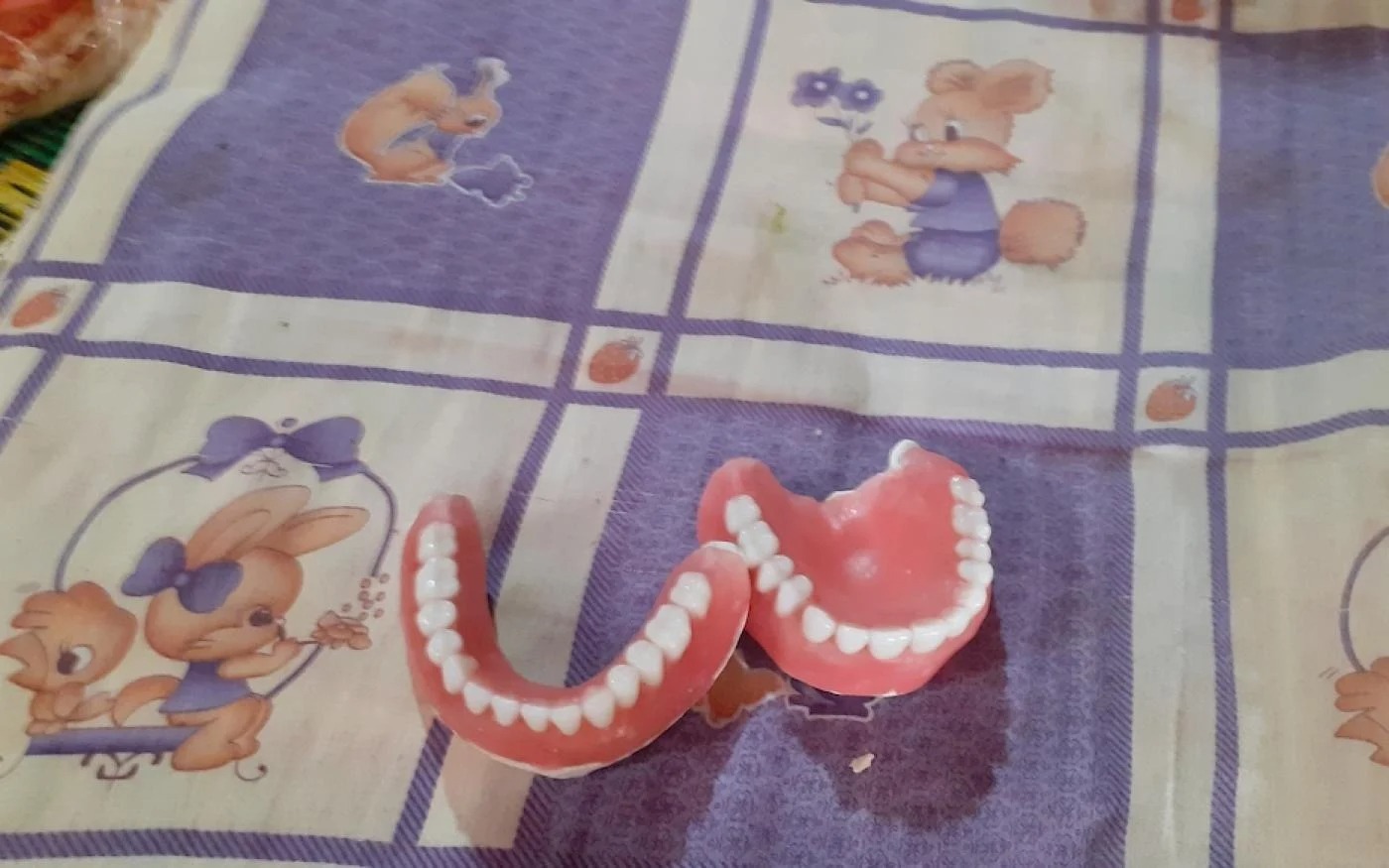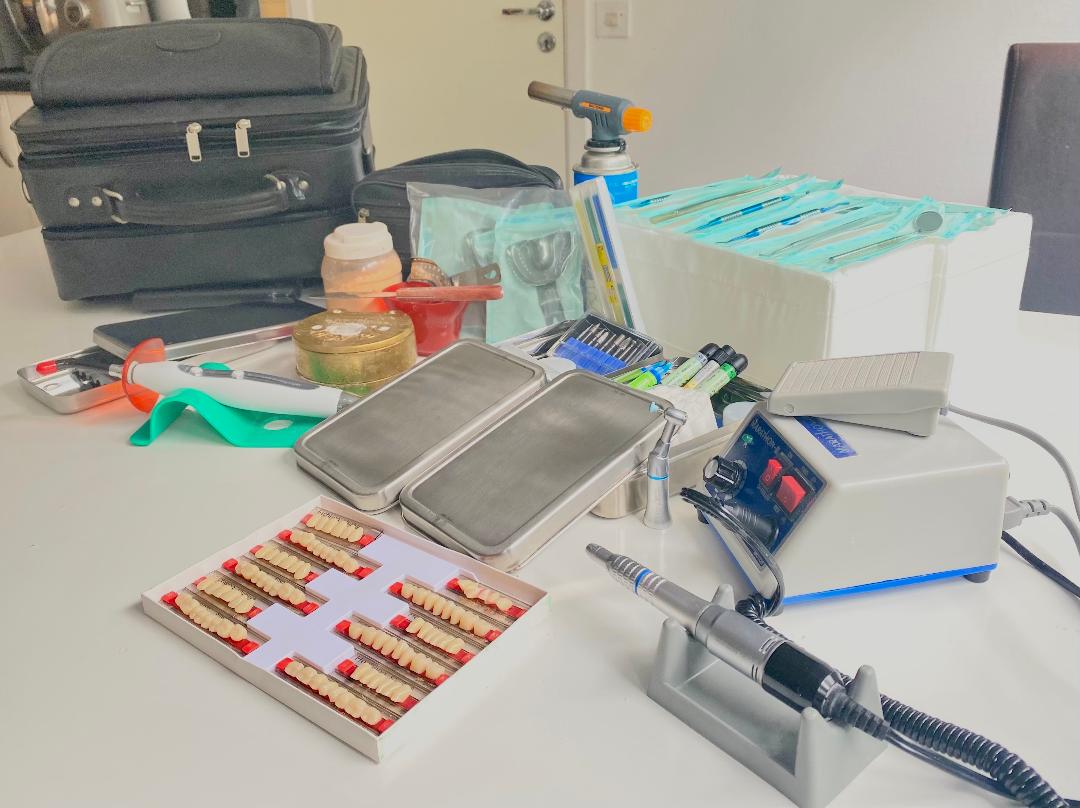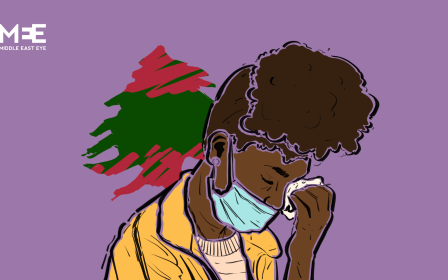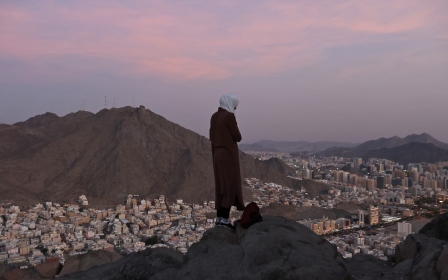From Syria to Europe: The Middle Eastern nomads fixing teeth without a degree
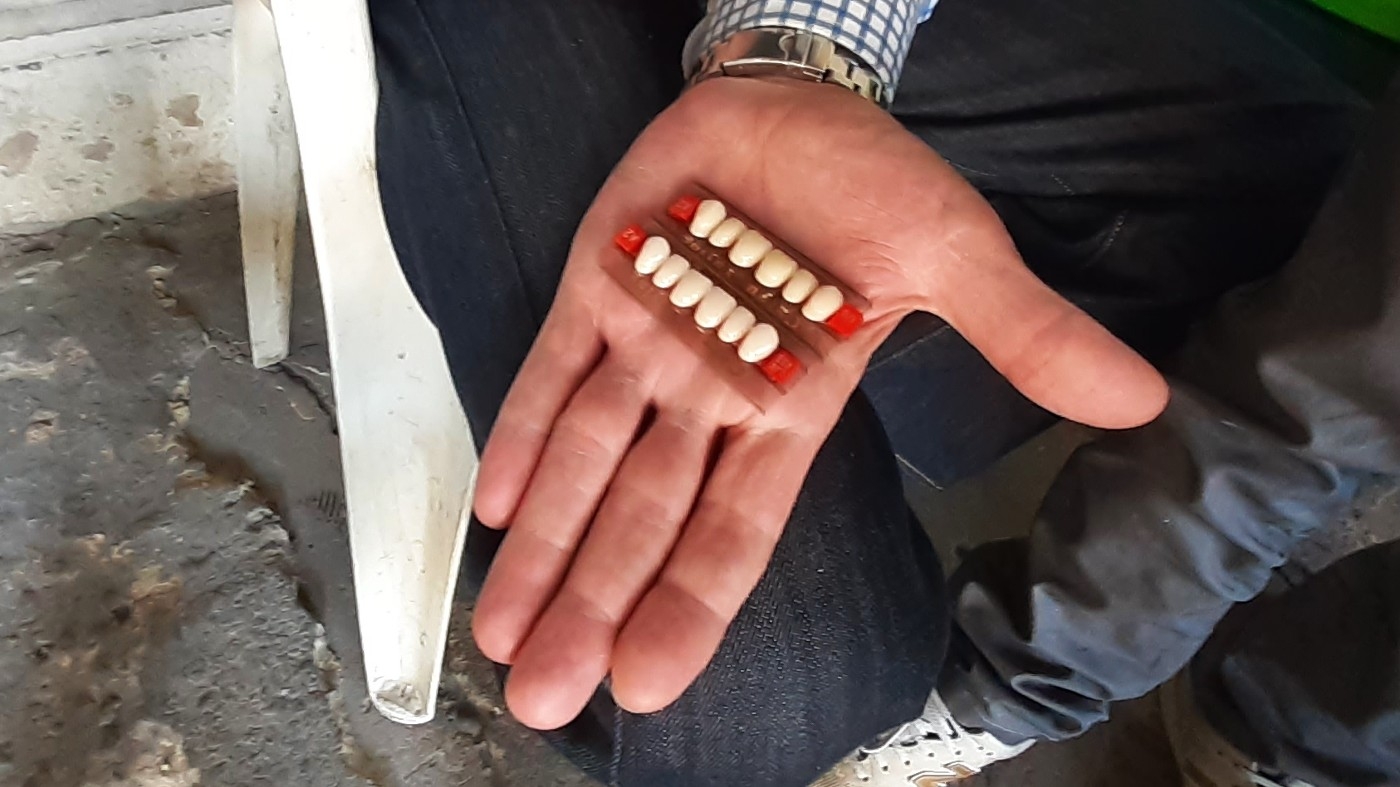
The business chief grabs a large copper coffee pot off the counter and pours a scorching black cardamom-flavoured liquid into the plastic cups of his regulars.
They chatter while twisting their rosaries, sitting on chairs facing the street, in the popular district of Abi Samra, on the heights of Tripoli in northern Lebanon.
'I learned the trade from my father. In the Doms, we are prosthetists from generation to generation'
- Oussama, dental technician
Oussama swallows the last sip in a single gulp from a colourful traditional cup that always finds a place in his large briefcase. Then he pulls out a blue mould for the teeth impressions. He then mixes a yellow powder, alginate, with water.
A viscous paste quickly forms, which he spreads in the mould. He disinfects his hands and plunges the mixture into the mouth of his client, a former employee of Middle East Airlines, the national flag-carrier airline of Lebanon. The elegant widower in his 60s, dressed in a chequered shirt and a navy-blue waistcoat, has his dentures fitted.
"Some of my teeth were still standing, but it was too expensive for me to fix them, so I preferred to have them pulled out and be fitted with dentures. It's more aesthetic and practical," he tells Middle East Eye, watching Oussama's gestures with a slightly anxious look.
At the end of the operation, he hands Oussama $50, half the bill. He will pay the second half upon delivery of the dentures.
In the cafe, customers are accustomed to the scene. They know Oussama well. One of them, a former militant in Jundullah, a Salafist armed group accused of attacks against police in 2019, has already had dentures made in the same place, after a debilitating time in jail. A few weeks earlier there, a Syrian journalist had given himself a new white-toothed smile.
"I learned the trade from my father by watching him do it and by accompanying him to his clients. In the Doms, we are prosthetists from generation to generation, we exchange a lot between us to improve ourselves," says Oussama.
Higher demand after economic crisis
The expertise of Doms is in demand, because their prices are two to three times lower than those of dentists. Oussama sells his dentures for $100, compared to $200 to $250 in private practice. They can also give appointments very quickly, on the same day with just a phone call.
With the economic crisis that has plagued Lebanon for two years, this type of on-demand service, although illegal, is increasingly sought after.
'Dentures are in high demand from the age of 40 in Lebanon, because dental hygiene is very poor'
- Oussama
The 50 percent of Lebanese who have health insurance pay for dental costs in dollars and are reimbursed in Lebanese pounds. In other words, they get back almost nothing, since the currency has lost 90 percent of its value.
For those who do not have insurance, the failed state does not provide any health coverage.
However, itinerant prosthetists did not just appear with the financial collapse; they were there several decades earlier. It is a phenomenon that became particularly visible since the emergence of a neoliberal economy where health services were gradually privatised, as explained by the Italian researcher Giovanni Bochi in his work on prosthetists in northern Lebanon.
The latter has a particularity: they come from the community of Doms, "gypsies" from the Middle East, often referred to by the pejorative term nawar in Arab countries. The community, with a semi-nomadic or sedentary way of life, is dispersed across several countries, mainly in Syria, Lebanon, Turkey, and Jordan. The prosthetist Doms are often referred to by the word qurbat, a term whose exact meaning no one knows but which is just as derogatory.
These men specialise in the manufacture of dentures, but also in the installation of bridges and teeth in gold or silver.
"Dentures are in high demand from the age of 40 in Lebanon, because dental hygiene is very poor. The majority of people don't brush their teeth, smoke a lot, eat very sweet food," Oussama tells Middle East Eye.
He works mostly through word of mouth, and never takes his eyes off his briefcase. Inside, there is a jumble of an electric motor that runs on car batteries to which he plugs his dental machines, disinfectant, sandpaper, a dental lamp, and rows of acrylic artificial teeth imported from Turkey and India.
Making a denture can take him several days. He works in his cardboard-covered tent in a camp north of Tripoli where he lives with his wife and children. With plaster, dental wax, a soldering iron, and a milling machine, the job is done.
"The use of these informal prosthetists can be attributed to their price, but also the lack of knowledge by the poorest, who are often unaware that they can have access to these services at low cost in dispensaries covered by the Ministry of Health," points out Fatima Jamal, a 28-year-old dentist who works in Denniyeh and Tripoli north of the country.
"A lack of hygiene can lead to serious infections, such as hepatitis B or HIV, the mouth being a particularly sensitive area," she says, warning against resorting to unlicensed prosthetists.
Profitable career
For the Doms, a community that lives in extreme poverty, the profession of prosthetist makes it possible to get by.
In the camp, where dozens of families live, Oussama is one of the few to own a car, which he parks under a canopy in a space near his tent.
The other occupations of the community are much more precarious. In Tripoli, men work for $3 a day in the souk al-Bale, where they clean second-hand shoes for resale, shine shoes or work in agriculture. In Beirut, some are grooms. The women resell clothes bought in bulk in the villages or beg with their children.
"The Doms are commercial nomads, like the Bedouins, who have long offered their services by moving around the villages. They traditionally worked in jewellery and ironwork, and began to decorate the teeth with gold leaf," says Yahya al-Abdullah, a Syrian researcher at the Ecole des Hautes Etudes en Sciences Sociales, who studies the community.
"Then they replaced teeth, at a time when there were no dental practices in the Middle East. The first group to practice the craft seems to have been trained or studied at university.
"Until recently, Doms, especially women, also offered other services in Syria, piercing ears or making tattoos," he says.
Kamal Kelzi, a Syrian dentistry student in Sweden, says that, in the past, women assisted their husbands with their dental work. "My grandmother always accompanied my grandfather, but since then the tradition has been lost, and only men exercise this profession."
Off to Europe
More surprisingly, from the 1970s, prosthetists from Lebanon and Syria began to offer their services abroad.
They work in the Maghreb and in African countries, mainly in West Africa (Mauritania, Senegal, Nigeria), before trying their luck in Europe, or even more rarely in Asia and South America.
They are no longer limited to cross-border movements between Lebanon and Syria, which for them constitute the same geographical space, but have turned into what they call al-Ghurba, which in Arabic means "migration," but also "alienation".
Hassan, in his 40s and now living in a country in northern Europe, tells his story. "I started by watching my father work, and I went to train in a laboratory for a month with other young people. I worked a little in Aleppo, and relatives offered me the chance to join them in Egypt, because there was more work there, then in Morocco."
Hassan works on demand, but the pattern changes when he travels to an African country, where dental practices barely exist in rural areas. "Over there, it was different. The Doms set up small clinics, we had a translator, and patients made appointments," he says.
In the early 2000s, he decided to try the European adventure, in the country where his family lives. The challenge was to obtain a Schengen tourist visa. He had to provide all kinds of documents and proof of a bank account with sufficient funds.
"The extended family contributed to fund the account, and the cost of the ticket and visa was between $2,000 and $3,000, but economically it was still very profitable, because, in one month in Europe, you earned what would be a year's salary in Syria," Hassan says.
Not all the work was done in Europe, and sometimes he relocated to Syria for the most complex work, such as ceramic crowns, zirconium, and vitallium teeth.
Today, Hassan, who took refuge in Europe with his family after the outbreak of war in Syria, has stopped working as a prosthetist in order to stay on the right side of the law, but he plans to resume his studies in dentistry.
France seems to have long been a popular choice for the Doms. In the camp where Oussama lives, Tawfiq, a 65-year-old former prosthetist, remembers having discovered France in 1977, at the age of 15, with his father, in the midst of the Lebanon war.
"At the beginning, my father worked mainly in the Maghreb, and there were regular maritime connections between Algeria and Marseille. That's how we started going to France. It was very easy to get a tourist visa, unlike today," Tawfiq says over a cup of tea.
"We worked for a few months in Europe with regular clients, and we went back to Syria," he says, explaining that clients in Europe were mainly immigrants from the Maghreb and undocumented immigrants.
In France, prosthetists distribute their business cards with just a telephone number in mosques, popular bars, and markets. They then shape their prostheses in low-end hotels. The milling machines run at full speed, and the neighbours just have to get used to the noise.
Doms circulate in several European countries, including Belgium, Italy, Germany, Spain, and England.
"We have always liked coming to France, but personally I preferred Yemen. We Doms, we do this job above all because we like to travel and be free, to work for ourselves, without constraints," says Tawfiq.
Women sometimes accompany their husbands and beg at certain times, such as during Ramadan.
"Many Dom men call themselves prosthetists, but in reality this profession is mainly practiced by families of a higher social level. However, the lure of profit has pushed more and more people to become prosthetists without having the necessary knowledge," says Yahya al-Abdullah.
Crackdown on 'Syrian suitcase dentists'
In April 2002, the travelling dental technicians were dealt a heavy blow in Europe after a client from Hauts-de-Seine in northern France filed a complaint, saying that the installation of a bridge by a Dom technician led to an infected jaw.
After more than a year of investigation, French police dismantled a network of 28 "Syrian dentists with a suitcase," who were based in several rooms of a hotel in Batignolles, in the 17th borough of Paris.
'This informal practice will soon disappear in Europe. The younger generations who now go to school want to do something else'
- Yahya al-Abdullah, researcher
They mainly came from the Syrian cities of Homs and Saraqeb. Half of them entered France without a visa, and together they had thousands of customers in the north of Paris and the Hauts-de-Seine. A year later, most were sentenced to two years in prison, some suspended. A minority chose to stay in France but most returned to the Middle East.
But the Syrian revolution in 2011, which turned into a war, changed everything. Since 2013, it has encouraged prosthetists to seek refuge for their families in Europe, in the countries they know and appreciate the most: France and Belgium.
It is no coincidence that they do not take the path through Turkey and the Balkans that is favoured by most Syrian refugees, but instead go through the Maghreb, the route prosthetists have used to enter Europe since the 1990s.
According to information obtained by Middle East Eye, it is by the latter migratory route that approximately 15,000 to 20,000 Doms have entered Europe over the past 10 years.
The families choose different routes to reach Morocco, and from there sneak into Melilla, a Spanish enclave, posing as Moroccan day laborers.
Detained in temporary-stay centres for immigrants, the families are then transferred to the European continent by the Spanish state. When they arrive on French soil, the families will first stay in very inexpensive hotels on the Place de Clichy where prosthetists carry out their work.
Today, a few men still discreetly practice the profession in France, and in particular make dental appliances.
"This informal practice will soon disappear in Europe. The younger generations who now go to school want to do something else," says Yahya al-Abdullah. In Arab countries, on the other hand, the profession still seems to have a bright future ahead of it.
* The first names of the prosthetists have been changed to preserve their anonymity.
*This article was first published in French.
Middle East Eye propose une couverture et une analyse indépendantes et incomparables du Moyen-Orient, de l’Afrique du Nord et d’autres régions du monde. Pour en savoir plus sur la reprise de ce contenu et les frais qui s’appliquent, veuillez remplir ce formulaire [en anglais]. Pour en savoir plus sur MEE, cliquez ici [en anglais].


